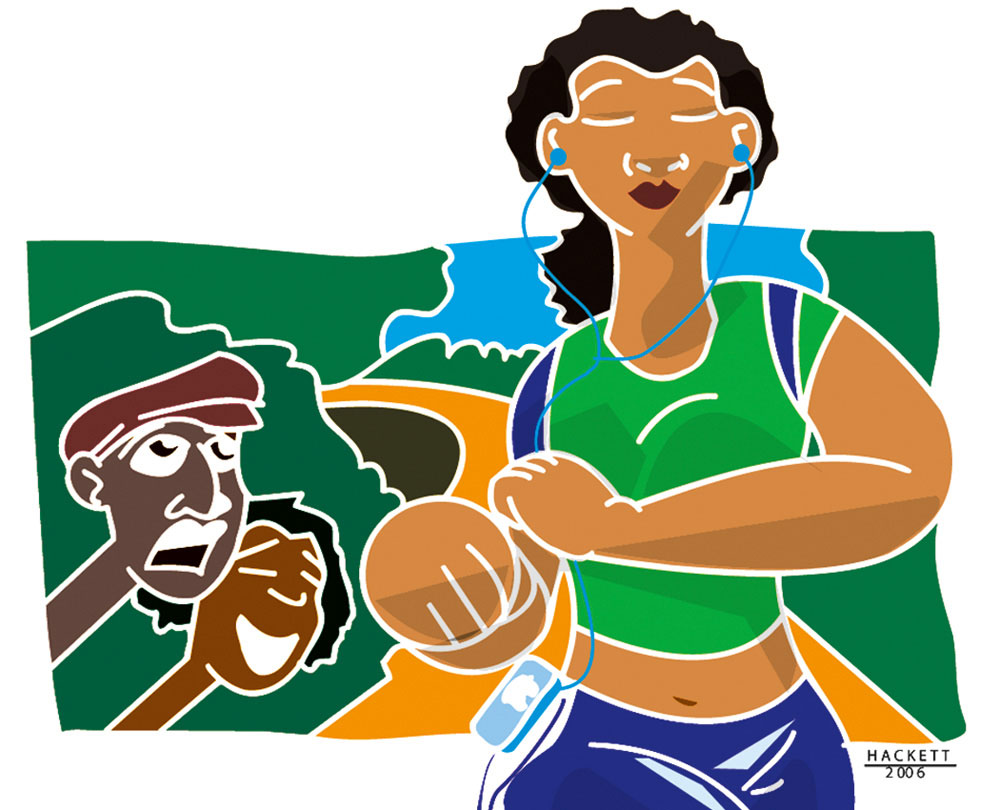Every great run has a soundtrack.
When I first fell in love with running, it was scored by my favourite songs. In those pre-iPod days, I ran with a CD belt, so each run took on the mood of whatever album I grabbed on the way out the door. Saucy, tempo runs to Carlos Santana. Slow, contemplative runs to Monty Alexander. Speedwork to a medley of old funk jams.
Pretty soon, I learned that dancehall worked best. I owe Beenie Man for taking me from a ten-minute mile to a nine. Bounty took me down to an eight. Junior Gong’s Half Way Tree has taken me over more hills than I can remember. And I clocked my first seven-minute mile the first time I ran to Sean Paul’s Dutty Rock.
But then I decided to train for the New York City Triathlon, a road race with a strict no-music policy, and I had to learn to run without my countrymen’s borrowed aggression. I tuned in to a completely different soundtrack — the sound of my feet hitting the pavement, the rhythm of my own breathing.
When I lived in Manhattan, my running soundtrack was mostly of my own making, save for the occasional honk of a car horn, the dreaded sound of a faster runner’s footsteps coming up behind me — or, worse, the shout of “On your left” as he or she went by. I ran mostly in Central Park or on the West Side Path, where my usual eight-minute-mile pace attracted no attention and gave me enough chances to yell my own gleeful “On your left.”
Now I live and run in Kingston. And there’s a whole new soundtrack to get used to.
“Yes, Fitness.”
“Gwan through, Veronica.”
“Lawd Jesus. Done now, man. You a go run off the good batty weh God give you.”
I’m running laps in Kingston’s Emancipation Park when I realise the commentary is directed at me. I am not a morning person, and I hate to run on a treadmill. I like to run at night to purge the day’s drama from my body. And I like to run alone. If I could, I’d run on the street, but the first time I tried this, at dusk one evening, my intended long run turned into speedwork as a madman chased me down Constant Spring Road. That leaves me with Emancipation Park — a flat, paved, five-hundred-metre loop that stays open till 11 pm, and comes with ample lighting, security, and a pool of commentators who would do well on the European circuit.
Most of my fellow park users turn out for a walk. Young couples stroll arm in arm. Groups of friends walk briskly. There are usually just a few joggers, and very few women run. I rarely hear threatening footsteps, but the commentary comes in a steady torrent. Respect, concern, even anger — the comments are as varied as the people who deliver them.
“Looking good, my girl.”
“Yow, da gyal yah can run.”
“She nuh hah nuh man? If she did have a man, she wouldn’t a run so.”
At first the commentary threw me off. I ran with a hat pulled low over my face, no matter how late it was, and I would slow down apologetically to pass walkers. Now that I’ve tuned in to it, I use it to gauge how well I’m doing. On a slow day, I attract no attention. On average days, I get a nod and a “Yes, Runner.” There’s a simplicity and an elegance to “Runner.” It used to be my favourite title until one fast Friday night, when I was upgraded to “Runnist.”
I could go back to running with music, but I’ve grown accustomed to the unpredictability of my very own Greek chorus. Like the perfect dancehall song, their rapid-fire delivery and lyrical dexterity ride the rhythm of my breathing and footfalls. Sometimes I struggle to keep my form, as on a recent Sunday afternoon when I ran by a bridal party posing for pictures.
Bridesmaid 1: She nuh know seh if she run so fast she a go tired.
Bridesmaid 2: If you did do likkle a dat, you frock wouldn’ tight so.
One evening during the World Championships I was running in a yellow tank and black shorts, a hastily borrowed green scrunchie in my hair. I ran by a group of elderly women walking.
“Poor soul, she mussi never make the team.”
Late one Monday night, I’m on mile seven of an eight-mile run when I hear footsteps. I look over my shoulder and see a blond man, mid-forties, bearing down on me. His gait and pace tell me he’s a runner. His presence in this park tells me he’s a tourist. I pull to the right to let him pass but as he goes by I change my mind and adjust my pace to stay just off his left shoulder.
We pass a group of four men walking.
“She keeping up with him.”
I pass the tourist. He passes me. I stay off his shoulder. Three loops later, we pass the men in the same spot.
“Stay with him, my girl.” It is whispered urgently, as though there were a stake in the outcome.
A thousand metres later, I am still off the tourist’s shoulder. I am at the end of my planned run. I am tired. But I look up and see the group of men about 150 metres ahead.
I mutter “Left,” and pull by. Neither the tourist nor his legs answer.
I sprint by the group.
“Yes, my girl. Show him, yes.”
“Show him seh is Jamaica him deh.”


















